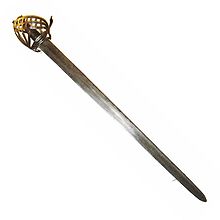broadsword
Jump to navigation
Jump to search
See also: broad sword
English[edit]

Alternative forms[edit]
Etymology[edit]
Pronunciation[edit]
Noun[edit]
broadsword (plural broadswords)
- (history) A type of early modern sword that has a broad double-edged blade for cutting (as opposed to the more slender thrust-oriented rapier) and typically a basket hilt.
- 1861, John George Wood, Athletic Sports and Recreations for Boys[1], page 93:
- The principal distinction between the broadsword and the rapier is, that the latter is formed only for thrusting, while the former is adapted for cutting also. Indeed, those who use the broadsword are, in my opinion, too apt to neglect the use of the point, and to give their attention almost exclusively to the cuts.
- A person armed with such a sword.
- (colloquial, often fantasy) Synonym of longsword
- 1990, Robert Jordan, “Conan the Magnificent”, in The Conan Chronicles II, published 1997:
- The Brythunian's arm drew back; the ancient broadsword with its strange, clawed quillons arcked spinning through the air.
- 2013, Colin Brown, “1415 Azincourt”, in Glory and B*llocks: The Truth Behind Ten Defining Events in British History[3], →ISBN, page 46:
- Henry carried a heavy broadsword with a cruciform hilt, and a decorated dagger on his hip known as a misericord because its blade could release souls. The English knights and men-at-arms carried broadswords, maces for smashing skulls and the murderous pole-axe, combining a spear with an axehead about five feet long.
- A flat, rectangular bread made from corn (maize) and beans by the Cherokee, traditionally by boiling rather than baking it.
- '2007 May 1, Andrew F. Smith, The Oxford Companion to American Food and Drink, Oxford University Press, →ISBN:
- Cherokee "broadswords" and "dog-heads," or Iroquois wedding breads (paired like dumbbells) might be eaten and described by visitors, but apparently were not adapted by colonial farmers other than a few intermarried pioneers.
- 2013 January 31, Andrew Smith, The Oxford Encyclopedia of Food and Drink in America, →ISBN, page 701:
- These breads were noted by early English explorers of the East Coast and continue to be made as Cherokee broadswords, Navajo kneel-down bread, and other dishes. Tamale pie is one of a group of American foods invented outside the ethnic […]
- 2014 January 7, Joseph Bruchac, On This Long Journey, the Journal of Jesse Smoke, a Cherokee Boy, the Trail of Tears, 1838, Scholastic Inc., →ISBN:
- Then took two broadsword corn dumplings from the basket Mother left out on the porch last night. Ate them as I walked our line of rail fence after letting out the cows from the barn. The dumplings were delicious, and I wished I had […]
- 2014 October 30, Robert J. Conley, Mountain Windsong: A Novel of the Trail of Tears, University of Oklahoma Press, →ISBN, page 143:
- Well, after awhile we just sat right down there on the ground by that fire beside the creek, and we ate some of those broadswords, hot and fresh, and I tell you, that was the best bean bread I ever ate.
Derived terms[edit]
Translations[edit]
longsword with a broad cutting blade
|
Verb[edit]
broadsword (third-person singular simple present broadswords, present participle broadswording, simple past and past participle broadsworded)
- (transitive, rare) To attack or kill with a broadsword.
- 1988, Jeffery Deaver, chapter 8, in Manhattan Is My Beat, London: Hodder, published 2016, →ISBN, page 79:
- She’d met her first black knight—a pock-faced man in his sixties, wearing an ugly brown hat—and escaped from him without being broadsworded to death.
- 1993, Edward Sanders, “[An East Village Hippie in King Arthur’s Court] Arthur Flips Out”, in Hymn to the Rebel Cafe, Santa Rosa, Calif.: Black Sparrow Press, →ISBN, page 190:
- He broadsworded one of his dogs in exuberance and it lay there whimpering till it expired.
- 1993, Greg Child, Mixed Emotions: Mountaineering Writings of Greg Child, Seattle, Wash.: The Mountaineers Books, published 2000, →ISBN, page 17:
- He took his steel-edged ruler, screamed and then broadsworded the snake into two equal lengths.
See also[edit]
Further reading[edit]
- Freddie Bitsoie, James O. Fraioli (2021 November 16) New Native Kitchen: Celebrating Modern Recipes of the American Indian, Abrams, →ISBN: “[…] the ancestral Cherokee would prepare bean bread, also known as broadsword because of its flat, rectangular shape.”
Categories:
- English compound terms
- English 2-syllable words
- English terms with IPA pronunciation
- English terms with audio links
- English lemmas
- English nouns
- English countable nouns
- en:History
- English terms with quotations
- English colloquialisms
- en:Fantasy
- English verbs
- English transitive verbs
- English terms with rare senses
- en:Swords
- en:Weapons
- English adjective-noun compound nouns
